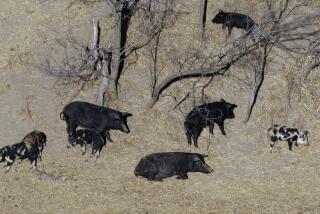Along the Border, Canada’s Hunters Aim at U.S. Moose
- Share via
DAAQUAM, Maine — On the other side of the rugged 100-mile border with Maine, Canadian moose hunters have built hundreds of tiny shacks on stilts, hunkering in them for hours at a time with rifles ready to take aim--into the United States.
Hunkering in the Maine woods during Canada’s moose-hunting season each October are Maine game wardens, waiting to catch Canadian moose poachers.
Each fall, the game wardens play a serious game of hide-and-seek with the poachers--and they mostly lose.
“All these shacks are built for Maine moose,” said Sgt. David Allen, gesturing at a seemingly unending row of rustic little cabins.
Up on 10-foot-high stilts, the cabins make perfect perches for hunters looking for moose, which are largely absent on the Quebec side of the border.
The border looks like a firebreak running through the tall pine forests, a cleared swath as far as the eye can see, about 50 feet wide and lined with the little raised cabins, or “caches.” Some are so small they look like outhouses.
For the most part, hunters have eluded capture.
Twice this season, wardens managed to get to the scene where Quebec hunters had supposedly shot into Maine, but by the time they got there, the dead moose had already been dragged back into Quebec by hunters on all-terrain vehicles.
In the 13 years since Allen started working in the region, only about a dozen Canadians have been apprehended for shooting Maine game from their side of the border or getting caught in the Maine woods with a firearm.
Getting caught has its risks--a $1,000 cash fine on the spot or three days behind bars. But the hunters come prepared, Allen said, always producing the cash or getting it almost immediately from friends or relatives just across the border.
The hunters “stay in the U.S. side for a couple of minutes, and after that they come back, so it’s pretty hard for your wardens to catch those guys,” said Serge Brouillet, a principal agent for the Quebec Ministry of Environment and Wildlife, who works the border.
Northwestern Maine is a sparsely populated wilderness of loggers, winding gravel roads and abundant wildlife, especially moose. Visitors are strongly advised to carry two spare tires and to make way for huge logging trucks.
Much of Quebec, on the other hand, looks like a scene out of the movie “The Sound of Music,” with picturesque little towns, church steeples, paved streets and sprawling farms. Moose also have been hunted heavily in the past, and that, coupled with the development, makes the beasts rare. And getting a permit to hunt moose in Maine is nearly impossible for Maine residents, never mind Canadians.
Brouillet thinks the poaching problem may be overstated. The caches have side windows looking along the boundary, he says, and it’s legal to shoot a Maine moose if it wanders across the border. Besides, he says, hunters don’t let other hunters get away with anything illegal.
“Imagine if, during the bull hunting season, I go there with a gun and I shoot a moose,” he said. “Five minutes after that, I will have a visit by the hunters around my cache.”
The caches near Daaquam are cramped and drafty.
One, made of gray plywood and accessible via a crude ladder, was barely big enough for two people and had an empty six-pack of beer, a newspaper, a bucket to urinate in and a chair inside. In the next, someone had left a funnel to imitate a moose call, a kerosene lamp and a pornographic picture on a wall.
“You’ve got to give these folks credit for what they go through to get a moose,” said Allen, shaking his head.
The cat-and-mouse game can get ugly, as it did 15 years ago when Allen caught a Quebec hunter shooting at deer at night. The hunter hit the warden in the mouth with a rifle, knocking out several teeth.
“I had a few little foot races and boat races,” said Lt. Mike Marshall, who has spent nearly 20 years on the border.
“Most of the time I lost, because if they get a head start on you, it’s pretty hard to get in front of them if they’re heading for the border. They fling their boat up on the Canadian side and flash you objectionable signs back.”
More to Read
Sign up for Essential California
The most important California stories and recommendations in your inbox every morning.
You may occasionally receive promotional content from the Los Angeles Times.













